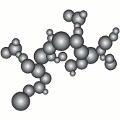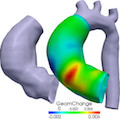Flow and transport of species are important in many processes in nature and industry. In general, they are modeled by systems consisting of partial differential equations.
Active fields of research are questions concerning the analysis, the numerical analysis, and the numerical simulation of partial differential equations from computational fluid dynamics (CFD). The considered applications include, for example, electrochemical systems, population balance systems and flows in porous media.

Flow through an aortic arch


Turbulent flow around a cylinder, velocity (left) and vorticity (right)

Thermodynamic models for electrochemical systems
The behavior of electrochemical systems is widely investigated with continuum physics models. Applications range from single crystal electrochemistry to lithium batteries and fuel cells, from biological nano-pores to electrolysis and corrosion science, and further.

Numerical methods for the simulation of population balance systems
These applications are modeled by population balance systems. Accurate and efficient numerical methods will be developed, in collaboration with partners from academics and industry, which will be in the long term the basis of optimal control methods for the considered processes.

Coagulation
The phenomenon of coagulation occurs in a wide range of applications, e.g., in physics (aggregation of particles, growth of gas bubbles), meteorology (merging of drops in atmospheric clouds, aerosol transport), chemistry (reacting polymers, soot formation) and astrophysics (formation of stars and planets).

Phase transition and hysteresis in the context of storage problems
Phase transitions and hysteresis are characteristics of energy storage problems. The aim is to formulate and analyse a thermodynamical model which discribes the storage problem.

Modeling, Simulation and Optimization for Biomedical Applications
Today, in medical science digital simulation instruments for processes in the human body are utilized in diagnistics and therapy planning. At WIAS, models for biological tissues, fluids, and their interaction as well as techniques in optimization and optimal control for decision support in biomedicin are devloped.

Modeling of thin films and nano structures on substrates
Thin films play an important role in nature and many areas of technological applications. In particular on micro- and nanoscales technological processes such as dewetting or epitaxial growth are used to design surfaces with specific material properties. Apart from the need to derive mathematical decriptions, analyis and numerical simulation, that serve to accelerate the development of new technologies, it is also exciting to understand material behaviour on these small scales.


